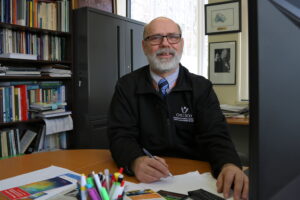
Marijuana legalization remains a hot-button topic on the worldwide forum, but especially in British Columbia where potent BC Bud is a high-earning agricultural product for especially the export market. Many in British Columbia think the illegal status of marijuana production and consumption is unjust, and our current laws are replicating the American alcohol prohibition era in the 1920s. Other Canadians believe cannabis is a dangerous product which might induce psychosis and other mental illnesses in a minority of youthful users – should they smoke or eat the reefer over a long period of time on a regular day-to-day basis.
Maybe the real debate is not whether marijuana should be legalized – perhaps we should be deciding what the appropriate age for smoking pot should be instead.
The varied responses to cannabis legalization were represented by a five person panel on April 17 in the Michael J Fox theatre. The forum was part of a series organized by the University of British Columbia and the evening’s debate provided an intriguing and often heated two-hour-long discussion.
The diverse panel was moderated by Shiral Tobin, the director of CBC’s
The Early Edition. The yes-camp featured Scott Bernstein from the Pivot Legal Society. Bernstein is a staff lawyer who specializes in strategic litigation and advocacy. The yes-side also included Mark Haden, an academic who supervises the addiction services staff at the Pacific Spirit Community Health Centre for Vancouver Coastal Health. The middle ground was reserved for Christian Schutz – a medical specialist in psychiatry and psychotherapy. The no-side was represented by Jim O’Rourke and Darryl Plecas. O’Rourke is the executive director of VisionQuest Recovery Society, and Darryl Plecas holds the RCMP University Research Chair in the School of Criminology and Criminal Justice at the University of the Fraser Valley.
Plecas opened the discussion by damning the possibility of marijuana legalization because he believed this legal reversal would be catastrophic for a small segment of the population. Plecas was likely making a reference to the low percentage of teenagers who smoked pot at a very young age and have become adversely affected after becoming chronic users. Throughout the conversation, Plecas persisted on establishing a link with marijuana and mental psychosis and insisted the nation’s youth should be protected from this dangerous substance.
Plecas also related marijuana to the growth of organized crime in British Columbia. According to Plecas, various criminal elements in the province are receiving generous profits by growing and distributing illegal cannabis. These criminals would not be affected if marijuana became legalized in Canada, because the bulk of British Columbia’s pot is shipped across the border to the United States. Plecas discussed how criminal gangs have multiplied on an exponential scale in the province because of the marijuana trade. According to Plecas, British Columbian gangs have grown from about eight to 131 various groups in 20 years. The number of gangs increased in British Columbia, because the over-the-border marijuana trade to the United States is a very profitable venture.
Jim O’Rourke is a former heroin addict and the head of a society which counsels addicts. He thought the entire discussion on marijuana legalization had little merit. In O’Rourke’s view, cannabis has essentially become legalized already, because there are many doctors in the province who are getting wealthy by prescribing marijuana to people who are seeking the legal means to smoke cannabis. O’Rourke further claimed there are at least 80 doctors in the Lower Mainland who are willing to provide medical marijuana to anyone who seeks it. O’Rourke decided the country’s medical marijuana scheme “will have a negative effect on future generations.” The well-travelled representative from this community-based organization also negated the drug’s medicinal qualities and considered marijuana to be an adverse substance which will bring harmful long term negative effects on the user’s emotional and mental health.
Sitting in the middle, Christian Schutz was aware of marijuana’s ability to produce mental psychosis. However, Schutz acknowledged pot as being a less addictive substance when compared to alcohol or tobacco.
Because Schutz sat in the middle, he sometimes offered arguments supporting the legalization of cannabis. Opponents of legalization often believe Canada will be overrun with users if cannabis is legalized. However, Schutz described the aftermath of heroin legalization in Zurich where the opposite effect had been produced. In the Swiss experiment, heroin users were treated for heroin addiction through the means of gradual attrition. Over the years, heroin use plummeted in Zurich as the cultural perception of the narcotic changed. During this legalization trial, the Swiss began to see heroin as a narcotic substance with medicinal properties, rather than as an inebriant favoured by the subversive elements of society.
Schutz applied the above argument to a study of 16 American states with medical marijuana laws. In this academic investigation, after the medical marijuana laws were introduced, cannabis usage declined amongst youths and increased in the adult population. Many alcohol users switched to cannabis use and as a side result, traffic accidents in each of those 16 states notably decreased. Schutz however expressed concerns about addiction to the drug and also thought marijuana might be responsible for creating cardiovascular issues in adults.
Scott Bernstein favoured legislation, because prohibition as a governmental policy has proved to be a total failure. Bernstein compared the present laws governing cannabis to America’s roaring 20’s, when crime lords made huge profits during the country’s experiment with alcohol prohibition. Bernstein is a believer in the harm reduction policy – an ideal where substance abusers are treated for their addictions in a caring environment, rather than being over-policed or jailed. In this theory, the application of too many legal pressures will adversely affect the addict’s treatment. In Bernstein’s experience, projects like INSITE in East Vancouver have saved lives – therefore pot addiction can also be better managed in an open society.
Mark Haden suggested the Canadian government should legalize all drugs because this “upfront approach to drugs makes them less successful.” Canada’s current drug laws have brought an unnecessary amount of glamour to illegal substances such as cannabis. If marijuana were to be legalized, this would transform the substance into becoming a mere innocuous societal distraction. Haden praised Latin American leaders from countries such as Mexico, where the drug wars have become sadistically violent and beyond control. Some Latin American leaders are seeking to have an open discussion over marijuana prohibition and Haden thought our country’s leaders should join this discussion. In essence, Haden thought Canada’s drug laws were having a harmful effect on the nation’s society, because the current rules make illegal drugs seem very attractive to our country’s youth.
Overall, the panel discussion proved to be very informative and provocative. However, the spirited audience rudely interrupted Plecas and O’Rourke on many occasions whenever the no-side argued their points. Additionally, the yes-side would have strengthened their positions if these panellists had mentioned marijuana’s many curative properties. After all, cannabis is an antiemetic and an analgesic substance, and is capable of curing a variety of diseases including glaucoma, multiple sclerosis, arthritis, AIDS and ADD.
 Marijuana legalization remains a hot-button topic on the worldwide forum, but especially in British Columbia where potent BC Bud is a high-earning agricultural product for especially the export market. Many in British Columbia think the illegal status of marijuana production and consumption is unjust, and our current laws are replicating the American alcohol prohibition era in the 1920s. Other Canadians believe cannabis is a dangerous product which might induce psychosis and other mental illnesses in a minority of youthful users – should they smoke or eat the reefer over a long period of time on a regular day-to-day basis.
Maybe the real debate is not whether marijuana should be legalized – perhaps we should be deciding what the appropriate age for smoking pot should be instead.
The varied responses to cannabis legalization were represented by a five person panel on April 17 in the Michael J Fox theatre. The forum was part of a series organized by the University of British Columbia and the evening’s debate provided an intriguing and often heated two-hour-long discussion.
The diverse panel was moderated by Shiral Tobin, the director of CBC’s The Early Edition. The yes-camp featured Scott Bernstein from the Pivot Legal Society. Bernstein is a staff lawyer who specializes in strategic litigation and advocacy. The yes-side also included Mark Haden, an academic who supervises the addiction services staff at the Pacific Spirit Community Health Centre for Vancouver Coastal Health. The middle ground was reserved for Christian Schutz – a medical specialist in psychiatry and psychotherapy. The no-side was represented by Jim O’Rourke and Darryl Plecas. O’Rourke is the executive director of VisionQuest Recovery Society, and Darryl Plecas holds the RCMP University Research Chair in the School of Criminology and Criminal Justice at the University of the Fraser Valley.
Plecas opened the discussion by damning the possibility of marijuana legalization because he believed this legal reversal would be catastrophic for a small segment of the population. Plecas was likely making a reference to the low percentage of teenagers who smoked pot at a very young age and have become adversely affected after becoming chronic users. Throughout the conversation, Plecas persisted on establishing a link with marijuana and mental psychosis and insisted the nation’s youth should be protected from this dangerous substance.
Plecas also related marijuana to the growth of organized crime in British Columbia. According to Plecas, various criminal elements in the province are receiving generous profits by growing and distributing illegal cannabis. These criminals would not be affected if marijuana became legalized in Canada, because the bulk of British Columbia’s pot is shipped across the border to the United States. Plecas discussed how criminal gangs have multiplied on an exponential scale in the province because of the marijuana trade. According to Plecas, British Columbian gangs have grown from about eight to 131 various groups in 20 years. The number of gangs increased in British Columbia, because the over-the-border marijuana trade to the United States is a very profitable venture.
Jim O’Rourke is a former heroin addict and the head of a society which counsels addicts. He thought the entire discussion on marijuana legalization had little merit. In O’Rourke’s view, cannabis has essentially become legalized already, because there are many doctors in the province who are getting wealthy by prescribing marijuana to people who are seeking the legal means to smoke cannabis. O’Rourke further claimed there are at least 80 doctors in the Lower Mainland who are willing to provide medical marijuana to anyone who seeks it. O’Rourke decided the country’s medical marijuana scheme “will have a negative effect on future generations.” The well-travelled representative from this community-based organization also negated the drug’s medicinal qualities and considered marijuana to be an adverse substance which will bring harmful long term negative effects on the user’s emotional and mental health.
Sitting in the middle, Christian Schutz was aware of marijuana’s ability to produce mental psychosis. However, Schutz acknowledged pot as being a less addictive substance when compared to alcohol or tobacco.
Because Schutz sat in the middle, he sometimes offered arguments supporting the legalization of cannabis. Opponents of legalization often believe Canada will be overrun with users if cannabis is legalized. However, Schutz described the aftermath of heroin legalization in Zurich where the opposite effect had been produced. In the Swiss experiment, heroin users were treated for heroin addiction through the means of gradual attrition. Over the years, heroin use plummeted in Zurich as the cultural perception of the narcotic changed. During this legalization trial, the Swiss began to see heroin as a narcotic substance with medicinal properties, rather than as an inebriant favoured by the subversive elements of society.
Schutz applied the above argument to a study of 16 American states with medical marijuana laws. In this academic investigation, after the medical marijuana laws were introduced, cannabis usage declined amongst youths and increased in the adult population. Many alcohol users switched to cannabis use and as a side result, traffic accidents in each of those 16 states notably decreased. Schutz however expressed concerns about addiction to the drug and also thought marijuana might be responsible for creating cardiovascular issues in adults.
Scott Bernstein favoured legislation, because prohibition as a governmental policy has proved to be a total failure. Bernstein compared the present laws governing cannabis to America’s roaring 20’s, when crime lords made huge profits during the country’s experiment with alcohol prohibition. Bernstein is a believer in the harm reduction policy – an ideal where substance abusers are treated for their addictions in a caring environment, rather than being over-policed or jailed. In this theory, the application of too many legal pressures will adversely affect the addict’s treatment. In Bernstein’s experience, projects like INSITE in East Vancouver have saved lives – therefore pot addiction can also be better managed in an open society.
Mark Haden suggested the Canadian government should legalize all drugs because this “upfront approach to drugs makes them less successful.” Canada’s current drug laws have brought an unnecessary amount of glamour to illegal substances such as cannabis. If marijuana were to be legalized, this would transform the substance into becoming a mere innocuous societal distraction. Haden praised Latin American leaders from countries such as Mexico, where the drug wars have become sadistically violent and beyond control. Some Latin American leaders are seeking to have an open discussion over marijuana prohibition and Haden thought our country’s leaders should join this discussion. In essence, Haden thought Canada’s drug laws were having a harmful effect on the nation’s society, because the current rules make illegal drugs seem very attractive to our country’s youth.
Overall, the panel discussion proved to be very informative and provocative. However, the spirited audience rudely interrupted Plecas and O’Rourke on many occasions whenever the no-side argued their points. Additionally, the yes-side would have strengthened their positions if these panellists had mentioned marijuana’s many curative properties. After all, cannabis is an antiemetic and an analgesic substance, and is capable of curing a variety of diseases including glaucoma, multiple sclerosis, arthritis, AIDS and ADD.
Marijuana legalization remains a hot-button topic on the worldwide forum, but especially in British Columbia where potent BC Bud is a high-earning agricultural product for especially the export market. Many in British Columbia think the illegal status of marijuana production and consumption is unjust, and our current laws are replicating the American alcohol prohibition era in the 1920s. Other Canadians believe cannabis is a dangerous product which might induce psychosis and other mental illnesses in a minority of youthful users – should they smoke or eat the reefer over a long period of time on a regular day-to-day basis.
Maybe the real debate is not whether marijuana should be legalized – perhaps we should be deciding what the appropriate age for smoking pot should be instead.
The varied responses to cannabis legalization were represented by a five person panel on April 17 in the Michael J Fox theatre. The forum was part of a series organized by the University of British Columbia and the evening’s debate provided an intriguing and often heated two-hour-long discussion.
The diverse panel was moderated by Shiral Tobin, the director of CBC’s The Early Edition. The yes-camp featured Scott Bernstein from the Pivot Legal Society. Bernstein is a staff lawyer who specializes in strategic litigation and advocacy. The yes-side also included Mark Haden, an academic who supervises the addiction services staff at the Pacific Spirit Community Health Centre for Vancouver Coastal Health. The middle ground was reserved for Christian Schutz – a medical specialist in psychiatry and psychotherapy. The no-side was represented by Jim O’Rourke and Darryl Plecas. O’Rourke is the executive director of VisionQuest Recovery Society, and Darryl Plecas holds the RCMP University Research Chair in the School of Criminology and Criminal Justice at the University of the Fraser Valley.
Plecas opened the discussion by damning the possibility of marijuana legalization because he believed this legal reversal would be catastrophic for a small segment of the population. Plecas was likely making a reference to the low percentage of teenagers who smoked pot at a very young age and have become adversely affected after becoming chronic users. Throughout the conversation, Plecas persisted on establishing a link with marijuana and mental psychosis and insisted the nation’s youth should be protected from this dangerous substance.
Plecas also related marijuana to the growth of organized crime in British Columbia. According to Plecas, various criminal elements in the province are receiving generous profits by growing and distributing illegal cannabis. These criminals would not be affected if marijuana became legalized in Canada, because the bulk of British Columbia’s pot is shipped across the border to the United States. Plecas discussed how criminal gangs have multiplied on an exponential scale in the province because of the marijuana trade. According to Plecas, British Columbian gangs have grown from about eight to 131 various groups in 20 years. The number of gangs increased in British Columbia, because the over-the-border marijuana trade to the United States is a very profitable venture.
Jim O’Rourke is a former heroin addict and the head of a society which counsels addicts. He thought the entire discussion on marijuana legalization had little merit. In O’Rourke’s view, cannabis has essentially become legalized already, because there are many doctors in the province who are getting wealthy by prescribing marijuana to people who are seeking the legal means to smoke cannabis. O’Rourke further claimed there are at least 80 doctors in the Lower Mainland who are willing to provide medical marijuana to anyone who seeks it. O’Rourke decided the country’s medical marijuana scheme “will have a negative effect on future generations.” The well-travelled representative from this community-based organization also negated the drug’s medicinal qualities and considered marijuana to be an adverse substance which will bring harmful long term negative effects on the user’s emotional and mental health.
Sitting in the middle, Christian Schutz was aware of marijuana’s ability to produce mental psychosis. However, Schutz acknowledged pot as being a less addictive substance when compared to alcohol or tobacco.
Because Schutz sat in the middle, he sometimes offered arguments supporting the legalization of cannabis. Opponents of legalization often believe Canada will be overrun with users if cannabis is legalized. However, Schutz described the aftermath of heroin legalization in Zurich where the opposite effect had been produced. In the Swiss experiment, heroin users were treated for heroin addiction through the means of gradual attrition. Over the years, heroin use plummeted in Zurich as the cultural perception of the narcotic changed. During this legalization trial, the Swiss began to see heroin as a narcotic substance with medicinal properties, rather than as an inebriant favoured by the subversive elements of society.
Schutz applied the above argument to a study of 16 American states with medical marijuana laws. In this academic investigation, after the medical marijuana laws were introduced, cannabis usage declined amongst youths and increased in the adult population. Many alcohol users switched to cannabis use and as a side result, traffic accidents in each of those 16 states notably decreased. Schutz however expressed concerns about addiction to the drug and also thought marijuana might be responsible for creating cardiovascular issues in adults.
Scott Bernstein favoured legislation, because prohibition as a governmental policy has proved to be a total failure. Bernstein compared the present laws governing cannabis to America’s roaring 20’s, when crime lords made huge profits during the country’s experiment with alcohol prohibition. Bernstein is a believer in the harm reduction policy – an ideal where substance abusers are treated for their addictions in a caring environment, rather than being over-policed or jailed. In this theory, the application of too many legal pressures will adversely affect the addict’s treatment. In Bernstein’s experience, projects like INSITE in East Vancouver have saved lives – therefore pot addiction can also be better managed in an open society.
Mark Haden suggested the Canadian government should legalize all drugs because this “upfront approach to drugs makes them less successful.” Canada’s current drug laws have brought an unnecessary amount of glamour to illegal substances such as cannabis. If marijuana were to be legalized, this would transform the substance into becoming a mere innocuous societal distraction. Haden praised Latin American leaders from countries such as Mexico, where the drug wars have become sadistically violent and beyond control. Some Latin American leaders are seeking to have an open discussion over marijuana prohibition and Haden thought our country’s leaders should join this discussion. In essence, Haden thought Canada’s drug laws were having a harmful effect on the nation’s society, because the current rules make illegal drugs seem very attractive to our country’s youth.
Overall, the panel discussion proved to be very informative and provocative. However, the spirited audience rudely interrupted Plecas and O’Rourke on many occasions whenever the no-side argued their points. Additionally, the yes-side would have strengthened their positions if these panellists had mentioned marijuana’s many curative properties. After all, cannabis is an antiemetic and an analgesic substance, and is capable of curing a variety of diseases including glaucoma, multiple sclerosis, arthritis, AIDS and ADD. 








